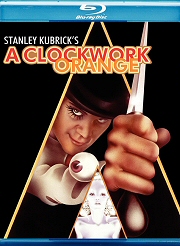Paul Farrell, Clive Francis
- Rated R
- Drama
- 1971
- Buy the Blu-ray
Reviewed by Jason Newman
rom the opening shot of Malcolm McDowell's smug, sinister grin to the ghastly realization that ends the film, Stanley Kubrick's "A Clockwork Orange" remains, 40 years on, a watershed moment in cinema that still terrifies and provokes on visceral levels unmatched even today. A dark, dystopian commentary on crime and punishment, the film continues to spark intellectual debate while retaining its emotional center; in other words, the rare film that hits you in the head and stomach simultaneously.
McDowell is Alex DeLarge (or Alex Burgess, depending on the scene), a vicious teenage miscreant whose hobbies are robbery, rape and delivering unsuspecting beatings for fun. Life is lived at night and London is just a playground to terrorize society for fun. When Alex gets convicted of murder and sent to prison, he eventually learns of an experimental rehabilitation program that will allegedly release criminals back into society within two weeks (a form of "killing the criminal reflex" as one minister calls it).
After being selected to be the next guinea pig, he learns that the "cure" is an extreme form of aversion therapy; one in which he is subjected, via straitjacket and eyelid openers, to near-constant images of extreme violence, war and destruction in an effort to associate destructive behavior with revulsion. The result: Alex feeling "the sickness" every time he thinks about committing a violent act and, subsequently, always acting good. Problem solved?
Kubrick's film, based on Anthony Burgess's 1962 book of the same name, is, in essence, a futuristic morality play, probing into the inherent nature of good and evil and questioning if a man with purely evil and grotesque thoughts can ever truly be rehabilitated. When a new and improved Alex is presented and tested in front of prison and government officials to demonstrate the therapy's effectiveness, it's the preacher that notes, "He ceases to be a wrongdoer. He ceases also to be a creature capable of moral choice." The grimly humorous reply: "Subtleties." “A Clockwork Orange” asks more questions than it answers: can you change the essence of a person who society deplores and, more importantly, should you? Is a criminal a perpetrator, victim or both? Is Alex's treatment brainwashing or therapy? If Alex is "cured," has he really become a good person or is it an artificial good? Does it matter?
Complicating things further is the film's backstory, in which Kubrick's script was based on the U.S. version of Burgess's book that removed a pivotal and plot-changing last chapter from the original novel. Kubrick had already finished the screenplay when he read the extra chapter, but noted in an interview that it was "unconvincing and inconsistent with the style and intent of the book. I certainly never gave any serious consideration to using it."
Regardless, when the film was released in 1971, it received the ultra-rare X rating from the British Board of Film Classification. After showing for less than a year, the film was blamed for a number of real-life copycat crimes, causing Kubrick to withdraw the film from distribution. Shockingly, the film wouldn't be shown legally in the UK until 2000, one year after Kubrick's death. (In the decades prior, fans who wanted to see the film had to either order it from a different country or buy bootleg versions surreptitiously on the streets.)
Both by limited budget and artistic decision, Kubrick and his director of photography John Alcott utilize natural light and handheld cameras to give the film a realistic and voyeuristic feel. When Alex and his crew break into a home and subsequently cripple a man and rape his wife, the realism is overpowering, if not intolerable; shot to make you so sick that you're powerless to help before the realization that this is fiction retakes your mind.
There's a reason why, 40 years after its release, you still see the Alex DeLarge Halloween costume every year. McDowell, Kubrick and Burgess created an anti-hero so terrifying because it was so plausible. Forget sci-fi or horror movies; "A Clockwork Orange" proves that the scariest monsters you can imagine are the ones roaming around free, next door to you, looking and acting just like us.
You can follow us on Twitter and Facebook for content updates. Also, sign up for our email list for weekly updates and check us out on Google+ as well.












